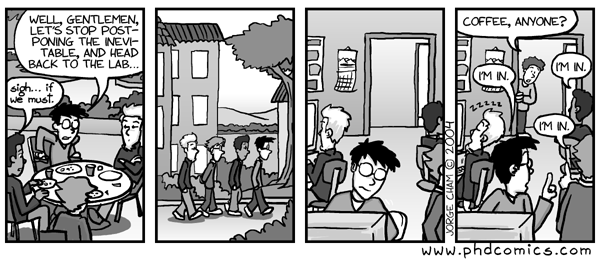In my discussions with other impoverished grad students, I've come up with four possible theories about why grad students get paid so little: getting paid for hours worked, getting paid by value to society, paying your dues, and cognitive dissonance as a student retention policy. Of these, I prefer the last, but I suspect the real reason may be one of the first three.
1. Paying by the Hour
 One possibility is that assuming the standard 40 hour/week model is overestimating the time that grad students actually work on
research. For example, if we assume that students only work for 1/4 of
that time (as illustrated in the figure above), then that only works out
to be about 10 hours/week, which ends up being about $40/hour: not
actually that bad. Succinctly: "You're getting paid for how much you actually work."
One possibility is that assuming the standard 40 hour/week model is overestimating the time that grad students actually work on
research. For example, if we assume that students only work for 1/4 of
that time (as illustrated in the figure above), then that only works out
to be about 10 hours/week, which ends up being about $40/hour: not
actually that bad. Succinctly: "You're getting paid for how much you actually work."2. Paid by Value to Society

Another possibility is to interpret one's pay as society's estimate of your work's value to society. The amount you get paid is "market value" for a person of your calibre doing the work that you are doing. Put more succinctly, "You're getting paid for what you're worth." Now these estimates are often right out of whack with reality (e.g. Basic Instinct 2, which had a budget for $70mil, but ended up only getting $5.8mil in gross domestic ticket sales), but it's probably fair to say most grad students' work is not worth much (I put my own stuff in that pile).





0 comments:
Post a Comment